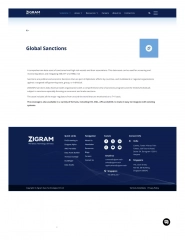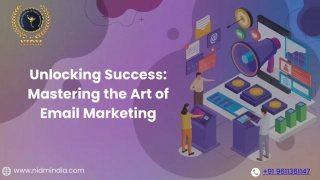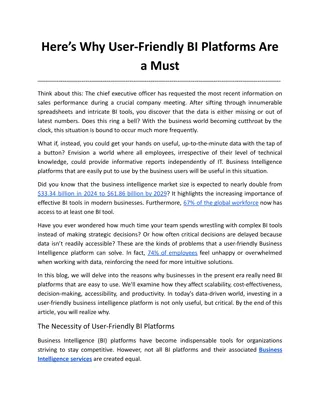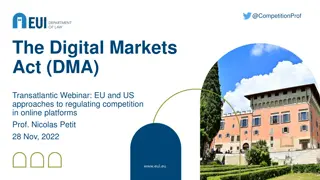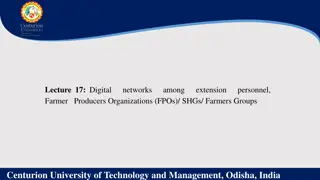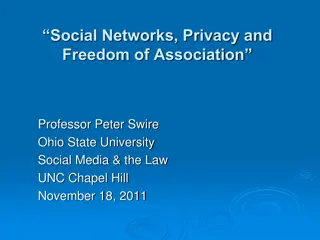Challenges of Regulating Digital Platforms
The debate surrounding the regulation of digital platforms is fueled by concerns over antitrust issues and abuse of market dominance. European policymakers are questioning the adequacy of current competition laws in addressing the unique challenges posed by digital platforms. Stakeholders advocate for a regulatory framework to ensure fair competition and innovation. However, there are inconsistencies in the approach, with the EU's Digital Single Market strategy aiming to both dismantle and erect regulatory barriers. The issue boils down to determining whether existing competition laws can effectively govern the behavior of digital platforms or if new regulations are necessary.
Download Presentation

Please find below an Image/Link to download the presentation.
The content on the website is provided AS IS for your information and personal use only. It may not be sold, licensed, or shared on other websites without obtaining consent from the author.If you encounter any issues during the download, it is possible that the publisher has removed the file from their server.
You are allowed to download the files provided on this website for personal or commercial use, subject to the condition that they are used lawfully. All files are the property of their respective owners.
The content on the website is provided AS IS for your information and personal use only. It may not be sold, licensed, or shared on other websites without obtaining consent from the author.
E N D
Presentation Transcript
What is a Platform and should they be Regulated? November 17th, 2015 Alfonso Lamadrid de Pablo alfonso.lamadrid@garrigues.com
Search on Garriwiki The origin of the debate: political dissatisfaction with competition rules We need a review of our competition law because the classical competition law is no longer adequate for what is taking place in society through digitalisation (M. Machnig, German Sec. State at Econ. Ministry, 2014) We believe that the growing power of some digital platforms is a wider challenge that warrants a policy consultation with the aim of establishing an appropriate general regulatory framework for essential digital platforms (French economic minister Emmanuel Macron and German economic minister Sigmar Gabriel, 2015). Doubts as to whether the regulatory framework, especially on antitrust allows us to respond to abuse of dominance (Axel Lemaire, French minister for Digital Affairs, 2014) DSM strategy the way they ( some platorms ) use their market power raises a number of issues that warrant further analysis beyond the application of competition law in specific cases "We don't want to regulate the net We want to regulate a small number of Internet platforms that today are blocking innovation from all of the other actors (French minister for Digital Affaires Fleur Pellerin, 2013) Seemingly contrarian views of several MS (Letter to Tusk from GB, IR, SV, EST, PO, FL, CR, NL).
Search on Garriwiki The inconsistent context of the debate The inconsistencies of the debate EU DSM Strategy aimed at tearing down regulatory walls but, at the same time . Consultation on platforms (aimed at erecting new regulatory walls ?) Consultation on collaborative economy partly aimed at addressing regulatory asymmetry, but at the same time Consultation on Platforms (aimed at creating regulatory asymmetry?)
What is a platform? WEB IMAGES NEWS MAPS SHOPPING
Search on Garriwiki What kind of animal? The Law of the Horse Platform The Blind Men and the Elephant Platform The blind are not good trail blazers (Easterbrook in The Law of the Horse ) A Bull Regulator in a China Shop
Ask not what you can do to competition law, but what competition law can do for you!
Search on Garriwiki WHY competition law can teach us WHY Competition Law can teach us WHY Competition Law can teach us WHY Competition Law can teach us Competition law is a legal distillation of common sense principles infused with sound economics Ample and flexible drafting of main provisions + nature as judge-made law + apparent complexity= evolution in line with market realities and economics, free from inference of small politics (see Antitrust and the Political Center) Enjoys privileged view of array of platform -related issues (often used to assess them) Issues not discussed theoretically and in the abstract, but analyzed in specific cases in the light of evidence and market realities Bottom-line: provides us with objective, technical, balanced, evidence-based non- dogmatic experience with regard to the functioning and virtues/perils of online platforms.
Search on Garriwiki WHAT competition law can teach us WHAT Competition Law can teach us WHAT Competition Law can teach us (I) 1- Intervention/Remedies should follow clearly identified concerns and be proportionate- not to protect some competitors or achieve visions of how the market should work- Striving for perfection may make matters worse- When in doubt, don t chill competition 2-Identification of platforms / two-sided markets: Two-sidedness is a matter of degree, and is not exclusive to online settings 3-What matter are competitive constraints in markets, not the competing business models (online platforms might compete in same markets as non-platforms and offline platforms) 4-Appearances of market power in online settings sometimes not to be trusted (services provided for free, differentiation, multi-homing, switching, entry interoperability, etc) 5-The competitive reality of even some platforms - Assessment in the light of evidence has not confirmed fears (e.g. Google/DoubleClick, Microsoft/Skype(?), Facebook/Whatsapp)
Search on Garriwiki WHAT competition law can teach us WHAT Competition Law can teach us WHAT Competition Law can teach us (II) 6-Size/absence of rivalry does not necessarily matter (or is not necessarily a bad thing). 7- Competitive ambiguity of business practices carried out in multi-sided markets [see The double duality of two sided markets; same features that may yield market power might help achieve optimal scale/demand side efficiencies. 8-Competition law has shown that it is readily available when things go wrong [e.g. portability restrictions, interoperability denials, pricing restrictions, excessive pricing (MIFs), etc] and provides an example of flexibility/adaptability of the law to dynamic settings 9- Competition law isn t the answer to everything (e.g. privacy/data protection?) 10- Competition is about consumer choice, much like public policy should be about enabling informed choices (educating consumers might be best way of protecting them). If info is power, then give it to consumers!
Av. d'Auderghem, 22-28 1040 Bruxelles Tel. +32 2 545 37 00 Fax +32 2 545 37 99 www.garrigues.com


